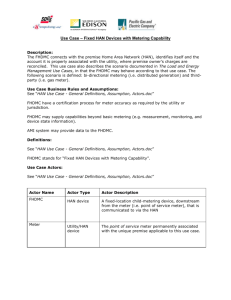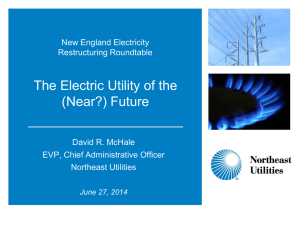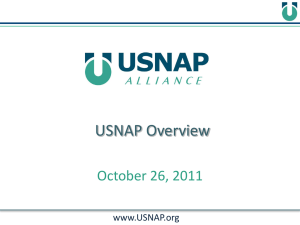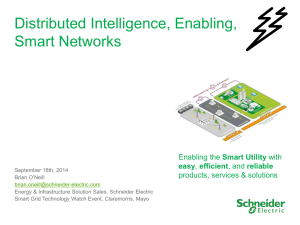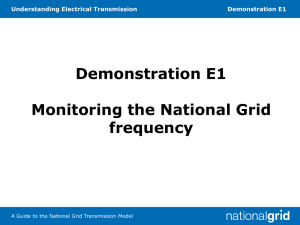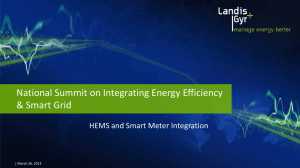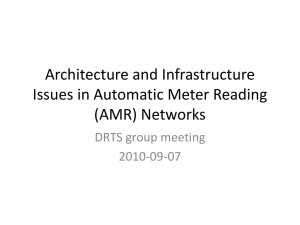Mohan Wanchoo, Jasmine Systems: Home Area Networks
advertisement
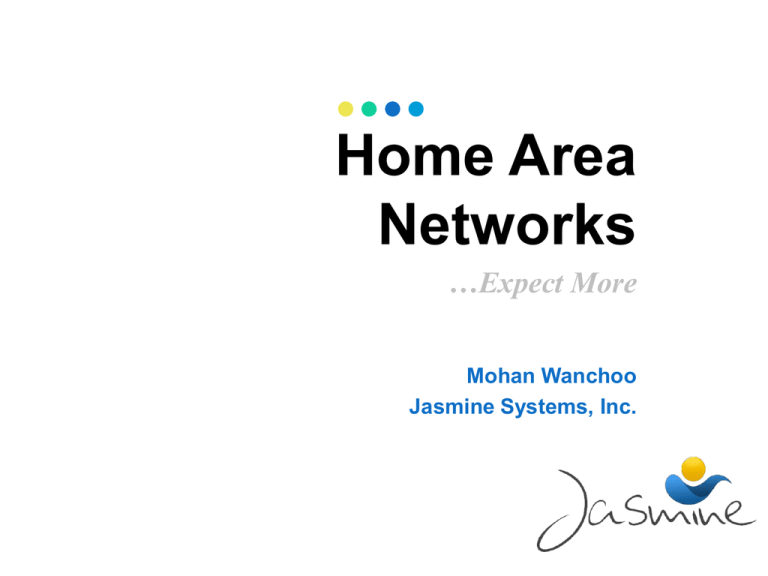
Home Area Networks …Expect More Mohan Wanchoo Jasmine Systems, Inc. Evolution of the Smart Grid AMR • Automated Meter Readings AMI • • • • • • Customer Voltage Measurement Price Signals sent to Customer Load Profiling/ Load Control 15 min. remote meter reads Remote meter programming Customer outage & Restoration detection, Theft Detection Smart Grid Solutions • Optimization of Grid Assets • Efficient Corridor Management • Correction of disturbances on the grid What is a HAN? “ A Home Area Network (HAN) is a residential local area network (LAN) for communication between digital devices typically deployed in the home, usually a small number of computers and printers and mobile computing devices. ” Source: Wikipedia How does it work? The HAN can use ZigBee Wireless Communication protocol with a central controller that communicates with appliances. The central controller collects appliance information wirelessly and presents the state of the household on a dashboard. Why implement a HAN? Show consumers their wasteful habits… …and empower them with real-time data to save energy Previously Currently Consumer had to wait one month for their energy bill With HAN Consumer can get their energy usage instantaneously and act on their wasteful habits Consumer serious interest in energy savings HANs create an opportunity for customers to engage in Utility’s Demand Response programs Via the HAN, consumers are able to cycle back appliances during peak hours and also turn off non-essential devices during peak hours. Consumers are now able to shift appliance energy usage patterns over time. Customers Can: Establish a savings goal and view progress towards achieving that goal “Set it and forget it” Realize energy savings and compare against peers in their community As a result, home energy consumption is monitored and adjusted to achieve the desired level of energy and financial savings. The benefits of HAN technology are expansive Awareness Real Time Info HANs facilitate an awareness of energy cost and consumption and make energy conservation easy, fun, and engaging HANs provide realtime information on: • Detailed energy usage information by device • Energy savings • Temperature / Weather • Curtailment messages from Utilities • Time of use pricing Analytics Consumers are provided data and metrics on: • Hourly / weekly usage • Peer to peer comparison Typical communication environment with Utility Stakeholders Consumer Utility Government Significant Energy Savings for each Stakeholder Significant savings for each stakeholder include: Utility • • • • • • Reduce peak demand Improve customer service by providing load control Faster outage detection Include residential and commercial customers in DR programs Communicate with customers instantaneously Eliminate manual, on-site meter readings Consumer • • • • • Reduce annual energy usage and cost by 10 -15 % Remotely control appliances / devices View energy usage and percentage of total consumption for each appliance / device Automatically reduce energy usage of appliances during peak hours Instantaneously view energy usage instead of waiting for next month’s bill Government • • • • • Reduce the need to build new power plants Reduce carbon footprint Reduce air pollution Decreased dependence on foreign energy Preserve the environment Implementation of HANs could result in some data-centered challenges Consumer Data Privacy • • Usage data available to public Consumers can operate in standalone mode or communicate with utility Consumer Interest Data Tsunami • • Massive amounts of usage data Opportunities for software vendors to provide creative programs to customers Challenges are an opportunity for companies • • Savings main driver Green planet Time-of-Use Pricing will influence consumer behavior Utilities will communicate with customers in real time Customers will respond to utilities in real-time Dynamic Time-of-Use Pricing results in adjusted consumer behavior Smart Grid is the vision of the future AMR $338 billion Estimated cost of the Smart Grid AMI Smart Grid Solutions $2 trillion Anticipated economic benefit by 2030 ? Questions


